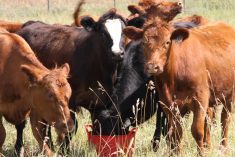WAWANESA, Man. – Bryce Fisher had a difficult choice to make in university between continuing his studies in animal science or buying a farm and farming full time.
“If you come from a farm, you truly know the joy of working a long, exhausting, dirty day, then coming in and having a 10 o’clock supper, a shower and then just feeling happy,” said Bryce, 26. “It’s just a very rewarding feeling.”
Bryce has owned and operated an apiary west of Wawanesa, Man., since he decided to farm at age 20. His parents, Mike and Maureen Fisher, own a cattle and grain farm five kilometres away, where Bryce and his brother Brock, 23, grew up.
Read Also

Organic farmers urged to make better use of trade deals
Organic growers should be singing CUSMA’s praises, according to the Canadian Chamber of Commerce.
Bryce had already worked with bees and honey for eight years when he started.
“I don’t know if I was becoming a pain in the butt, but when I was 12 my dad suggested I go get a job,” Bryce said. “When you’re 12 and making a paycheque, it’s awesome.”
He landed a summer job at another apiary where he worked directly with the bees.
“An older bee will go out and bring in the nectar. The younger bees just keep cleaning the cells,” said Bryce. “You can see guard bees, sitting on the entrance, smelling the bees to make sure they’re coming home to the right hive…. If they’re coming from a different hive, they might be trying to steal honey.”
After two summers, the owner of the apiary wanted to sell the business. Bryce decided to buy the apiary.
“It was kind of a scary thing,” he said.
Bryce’s dad, Mike, thought the apiary was a good way to diversify the farm. It was also a means to generate more income without sacrificing the more important aspects of life.
“I don’t even want to think about 10,000 acres. That would drive me nuts. My family always has been community minded and you can’t do that and be huge, too.”
As a business owner, Bryce learned the differences between employer and employee.
“I didn’t realize the risk and responsibility. Working for another beekeeper.… you work that day and if something breaks you go home and it’s fixed (when you get back) the next day,” said Bryce, who has one employee and about 300 hives.
“Now if something breaks, it comes out of your account and you’re the one working the overtime in the evening.”
Bryce owns and lives in a farmhouse a few kilometres from his parents’ farm. Having a different residence provides separation between his operation and his parents’ farm but they help each other out when needed.
“The neighbours that live between my parents and I are constantly joking that they see our vehicles going back and forth so many times per day.”
Studying agriculture at the University of Manitoba is a tradition in the Fisher family.
His father, grandfather and two of his great-grandfathers were all “aggies,” said Bryce, who has a degree in agriculture. Brock graduated with a diploma in agriculture.
Like his older brother, Brock returned home after university and now works with Mike on the cattle and grain side of the family farm.
Mike and Maureen said it’s nice to have the next generation involved.
“I enjoy working with my kids, even if we do fight sometimes,” said Mike, with a laugh. “It keeps the blood flowing.”
The conflict over what to do and how to do it is probably hardest on Maureen. She often assumes the roles of peacekeeper, mediator, counsellor and psychologist.
“It’s very hard for a mom to sit there and see the stress and tension going on between the three parties,” she said. “I tend to stand up for my kids.”
Family drama on the farm is preferable to calm telephone conversations with farflung children.
“I like (having) my family back in my little nest,” Maureen said. “Most nights we’re all together, all four of us in the field working.… For a mom, that’s important.”















